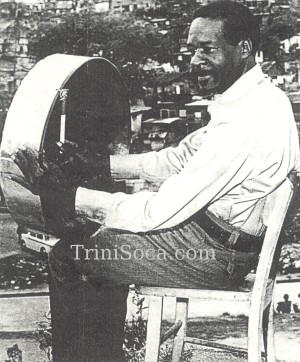Remembering 'Spree' Simon
By Terry Joseph
April 18, 2001
Trinisoca.com
Today marks the 25th anniversary of his death, but mere mention of the name Winston "Spree" Simon in the pan fraternity still elicits emotion and creates controversy.
While a large body of pan enthusiasts insists he was the first person to play a recognisable tune on pan, there are those who contend it could not have been Spree.
Interestingly, Spree himself never publicly claimed that distinction. It is an accolade pinned to his chest largely by proud fellow villagers from the John John area where he grew up.
Born at Rose Hill, East Dry River in 1930, his detractors say he would have been too young to shine at the time pan made that first developmental leap. What is not in dispute is that Spree executed the best-remembered pan performance of the 1946 Carnival. And since that event is widely recorded as the first time the instrument had been used as a lead voice in the yet fledgling steel orchestra, it seems more than reasonable to link both situations.
Several pan historians, some of whom were probably on hand for his public premiere of the 14-note tenor pan on March 5, 1946 (Carnival Tuesday of that year), insist that no one had hitherto produced that level of music.
To the delight of the Broadway Carnival competition audience, which included then Governor Sir Bede Clifford and Lady Clifford, socialite Audrey Jeffers and calypsonian Lord Kitchener, Spree played Schubert's "Ave Maria", the hymn "God Save the King" and Kitchener's "Lai Fook Lee"; the 1946 Road March.
It is useful to remember that the speed of communication in 1946 was not what it is today. Indeed, it is possible that similar developments might well have been taking place in other centres, so claims coming from those quarters cannot be summarily dismissed.
But Spree's larger value to pan history is almost vulgarised by the controversial claim. His importance to pan lore is far more substantial. Living in John John, Spree was virtually ringed by factories producing biscuits and other products that used drums. Discards from those industries gave him his first "kettle-drum" and it was an accident with this prototype that prodded him to create the 14-note pan.
Since African drumming did not find favour with the authorities, he decided to investigate the possibility of making music from the tins.
His kettle-drum was a rudimentary one-note instrument, used largely for percussive highlighting in what was essentially an elaborate rhythm section, euphemistically called a band.
As the story goes, one night when the band was taking a jamthrough the district, he loaned his instrument to a fellow member. Upon retrieving the pan, Spree discovered it had been brutalised, much of its original convex playing surface had been beaten inward.
It was in trying to repatriate the original shape to the pan (by beating it from inside with a big stone), he discovered different sounds coming from the various areas of the playing surface. By alternately using a piece of wood, he was able to vary tone. Spree produced a four-note pan from this experiment.


Replies
Wniston"spree Simon so many people would deny him his true place in Pan history, but he had done many things by the time he was sixteen.
There are conflicting stories about this part of our History. It would be a good thing if WST could do an interview with ELLIE MANETTE and get HIS.....STORY. Lets not miss this opportunity.
True, Cecil Hinkson.
There are several conflicting stories and third hand accounts. It would be great if pioneers still around would collaborate to give us an accurate account as to what really happened.
I give credibility to this version primarily because of my respect for the late Terry Joseph, who was a renowned cultural journalist in T&T.
I am often confused by the fact that members of this forum and others seem to wish to deny Winston "Spree" Simon his place as the foremost creator of the steel pan as we know it today.
I agree, Glenroy. I applaud Winston "Spree" Simon, and the falsifications have done more to harm his legacy, than to help it. He should have his place in history, as long as it's, "his place in history". And, by the same token, we should be equally as outspoken, for others who also deserve their place in pan history. Regardless, Spree is a pan icon, deserving of our country's highest national award.
GHOST
Hi,
I am Felix Geoffroy and had been a member of Tokyo at the time he, Spree played those tunes in the Savanah,
that year we played Ju Ju warriors and one of the tunes he played which you missed was I am a warrior.
Which in the controversy was the first complete tune that was ever played on the steel pans. FACT!
Felix